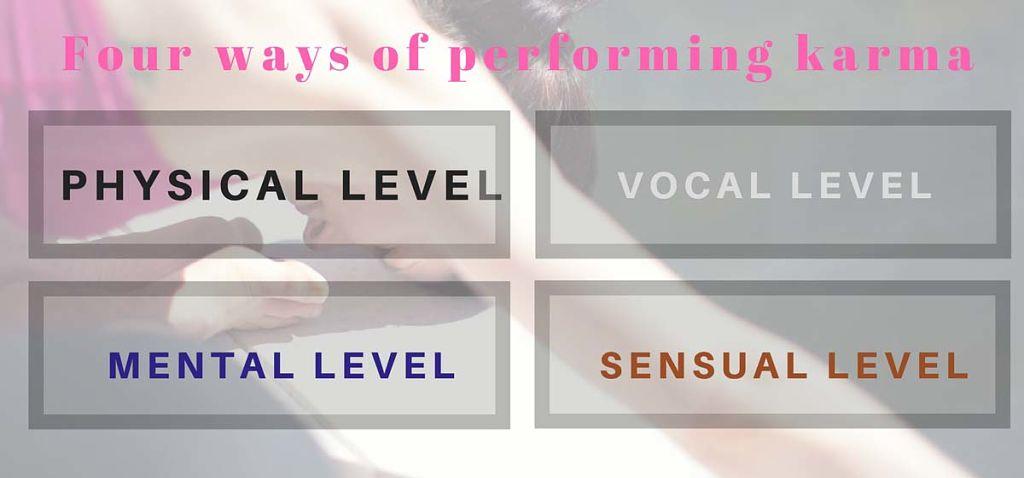The law of Karma says that each action that we are performing continuously does not get disappeared without a mark or an effect. It creates an appropriate result for the performer. He has to face the consequences of is Karma at any cost. It is impossible to ignore the result. The result of the Karma appears quicker or delay as per the nature and intensity of the Karma. For the fruits of Karma, there will be the interplay of a variety of different factors such as intention, desire, will, feelings, efforts and its repentance, self- change, hidden power of nature etc. Aurobindo defines Karmic Law as –“According to the energy put forth; shall be its return, subject to the complicated working of many world forces.” Forces, here, means mental and sensual activities like intention, desire, will, want etc.
Karma is the Sanskrit word which literally means an ‘action’. The root of the word is ‘Kri’ which means “to do” or “to perform”. Thus, to do all action is Karma. The actions or Karma is performed in four ways:
Physical Level
They are outer actions done by the physical body. Providing help to the needy, working in an office, robbery, killing etc are the physical karma. Besides, activities of the body where conscious mind is not involved such as sleeping, moving body, sneezing, yawning, blinking of eyes, breathing etc are also a part of physical Karma.
Vocal Level
The words that you speak are a part of the vocal action. Speaking honest words or dishonest words, kind words or unkind words, backbiting, slander, words that propagate lies and hate etc all are the karma at vocal level.
Mental Level
The activities of different types of thoughts and feelings are called the karma at Mental Level. When the mind is filled with positive thoughts and good feelings such as- love, empathy, kindness, etc. then it is a positive Karma. Negative thoughts, bad feelings like- fallacy, deceit, untruth, hatred, anger, jealousy etc are the part of negative Karma.
Sensual Level
Actions of 5 sense organs (eye, ear, skin, tongue, nose) are said to be actions at sensual level. We can use the eyes differently to watch both positive and negative. Reading a book and collecting knowledge is an action of eyes. Watching pornography is another action of eyes. Again question may arise- is watching pornography is a sin or a bad karma, and reading a book is good karma! Later on, we will come to know what is right and what is wrong. Anyway, the activities of eyes to see different things are karma. Hearing different things, sense of smell, touch, and taste etc all constitute Karma.
Karma encompasses each and every type of action. There is no any choosing and rejecting any types of action. Each and every action that we perform consciously or unconsciously is the Karma. It may involve body, speech, mind, and sense or some combination among these four. Thus Bhagawat Geeta states,-“None can remain to do nothing even for a moment, everyone is driven to action by the modes of nature born qualities.” So, for every moment living beings keep performing actions knowingly or unknowingly.
For each action, there is a reaction. Thus, the law of Karma is also referred as “the law of action and reaction” or “the law of cause and effect”. When the reaction is good, people call it reward, and the bad reaction is said as a punishment. Whatever the seed of Karma is sowed, the fruits will be ripened as per the seed. Many people are unaware of Karmic Law. Had all people know about it there will be no crime and no anti-social activities. The Law of Karma has perfect eyes. Law of Action can be compared Newton’s Law of Motion that every action has an equal and opposite reaction. Whatever we think, speak, intent or act; our life rolls accordingly. There is one event in Buddha’s life related to law of karma:
Buddha was preaching his disciple. He told that for every suffering, meditation is the solution. One of the audience said,-“There is your disciple who is by birth blind. What can be more troublesome misery than to be blind? How is his misery cured?” Buddha and his disciple including the blind disciple listened to it and got curious about the audience’s question. Buddha closed his eyes for a while. Buddha had the power to see past and future. He tried to see the past of the blind disciple’s life. In one of the past lives, Buddha found an important Karmic issue. In that very life, the blind disciple was an ayurvedic doctor. One day a lady with eyes problem came to him and said,-“Dear doctor, I finished my entire property for treatment of my eyes but got unsucceeded. Now, I have no money. If you can cure my eyes, I including two children will be your servant throughout the life.” The doctor started her treatment. After the treatment of a week, her eyes got improved. The eyes were on the way to complete cure. But, the lady got feared for her promise to the doctor. She thought that to be servant including her two children throughout the life will be difficult. So, she tried to deceive the doctor. She told the doctor that the condition of her eyes was degrading. The doctor became angry because he knew the real condition of her eyes. In fact, the intention of the doctor was not to keep them servant throughout their life. The doctor would treat the lady for free or on credit whatever the lady wants. However, due to lying of the lady, an evil thought aroused in doctor’s mind. The treatment was continuing. The following day of the lady’s deceives, the doctor kept poisonous substance into the lady’s eyes in the place of medicine. After that, the lady became completely blind. Buddha revealed this secret to the audience including all of his disciples. He also taught that all people must have to face the fruit of their Karma in the very life or in coming life. According to law of karma, One can never escape from his Karma. However, now the blind disciple is walking on the right path with the right intention. This will slowly minimize the effects of the bad Karma.
There is a perfect law of Karma. It looks whether a mistake is done knowingly or unknowingly; intentionally or unintentionally. The reaction of the action will appear accordingly. For example, a cricketer hit a person with a cricket ball while balling. Now, his intention was not to hit. Had he hit intentionally the reaction would be different. Killing a person by a murderer by a knife and death of a patient with a knife of a doctor’s hand while doing operation will create different reactions. The murderer kills intentionally but the doctor has the different case. Thus, fruit is also different. If a person does any mistake, but, later on, he realizes and moves in the right path; then the effect of bad karma will be reduced.

